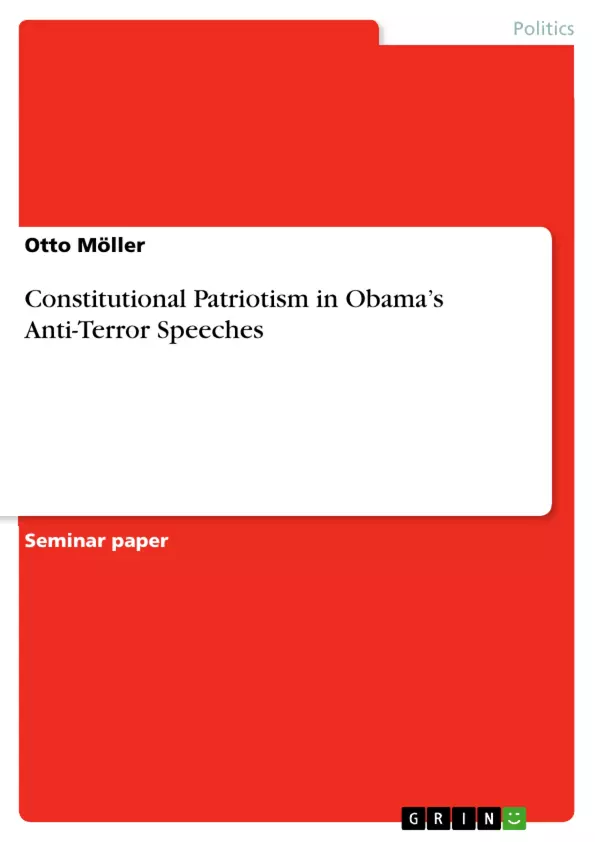What is Constitutional Patriotism? How is it used in his three speeches to gather the spirits of the Americans? How does the notion of nation state differ between the EU and the United States?
According to Ernest Gellner “It is nationalism which engenders nations, and not the other way round.” Surely most nations were formed on a nationalistic idea, but with nationalism follows patriotism and a sense of proselytisation. First of all what is a nation and why is it of relevance for today's international system?
A nation defines itself through its territory, its culture and its political community which is represented and run by a sovereign organized government. The unite state acts motivated by self interests. States are the most common structure of state organisation in the international system. They enjoy independence and legitimacy. Nation states are of extraordinary relevance for the field of international relations because they are more robust once they are established based on a distinct nationality. Moreover, it is the only structure in which “the growth of democracy is possible and which does not have a tendency to expand its territory.” This strong and steady status of nations turned out to be crucial for the development of “modern financial, industrial and technological civilization in Western Europe in the 17th and 18th centuries.”
It was only in the 16th and 17th century that the people of a state obtained the right to choose their representatives, before that they were “subjects” to the ruler of the state. “States ruled in that way had seven different forms, personal rule, theocracy, city state, oligarchy, military state, tribal state, and empire.”
Inhaltsverzeichnis (Table of Contents)
- What is Constitutional Patriotism?
- How is it used in his three speeches to gather the spirits of the Americans?
- How does the notion of nation state differ between the EU and the United States?
- Intro:
- Nationalism and Patriotism
- The Concept of the Nation State
- Evolution of the Nation State
- Nationalism and Terrorism
- Constitutional Patriotism
- The Theory of Constitutional Patriotism
- Criticisms of Constitutional Patriotism
- Constitutional Patriotism in Diverse Societies
- Constitutional Patriotism in the United States
Zielsetzung und Themenschwerpunkte (Objectives and Key Themes)
This essay aims to analyze how President Barack Obama employs constitutional patriotism in his speeches addressing terrorism. The essay examines the concept of constitutional patriotism, its origins, and its application in the context of the United States and the European Union. It seeks to understand how Obama uses this framework to unite Americans in the face of terrorism and explore the potential for its application in a multicultural environment.
- Constitutional patriotism as a framework for political identification in diverse societies.
- The role of constitutional patriotism in uniting citizens in the face of terrorism.
- The application of constitutional patriotism in the United States and its potential application in the European Union.
- The relationship between constitutional patriotism, nationalism, and the concept of the nation-state.
- The challenges of political integration and identification in increasingly diverse societies.
Zusammenfassung der Kapitel (Chapter Summaries)
- What is Constitutional Patriotism? This section introduces the concept of constitutional patriotism and its theoretical origins, tracing its development from Karl Jaspers to Jürgen Habermas. It examines the core idea of the theory, which advocates for political identification based on shared norms and values rather than cultural belonging.
- How is it used in his three speeches to gather the spirits of the Americans? This section delves into the application of constitutional patriotism in Obama's speeches addressing terrorism. It analyzes how Obama utilizes the concept to unify the American people and counter the threat of terrorism.
- How does the notion of nation state differ between the EU and the United States? This section explores the differences in the concept of the nation-state between the United States and the European Union. It discusses the relevance of constitutional patriotism in promoting political identification within these diverse entities.
- Intro: This section provides an overview of the concept of nationalism and its relationship to patriotism and the nation-state. It discusses the historical evolution of the nation-state and the challenges posed by terrorism to national unity.
Schlüsselwörter (Keywords)
Key terms and concepts explored in this essay include constitutional patriotism, nationalism, nation-state, political identification, terrorism, political integration, diversity, multiculturalism, United States, European Union, Barack Obama, and the threat of terrorism.
Frequently Asked Questions
What is the concept of Constitutional Patriotism?
It is a form of political identification based on shared democratic norms and values (the constitution) rather than on ethnic or cultural nationalism.
How did Barack Obama use Constitutional Patriotism in his speeches?
Obama used the framework to unite a diverse American society against terrorism by emphasizing shared constitutional ideals and a common political destiny.
How does the nation-state differ between the EU and the US?
The US is built on a constitutional idea of a "nation of immigrants," while the EU consists of established nation-states with distinct cultural histories, making political integration more complex.
What is the role of nationalism in the international system?
Nationalism engenders nations, providing a robust structure for democracy and legitimacy, though it can also lead to patriotism and territorial expansion tendencies.
Who are the key theorists of Constitutional Patriotism?
The theory traces its origins from Karl Jaspers to the influential German philosopher Jürgen Habermas, who advocated for non-cultural political identification.
- Quote paper
- Otto Möller (Author), 2016, Constitutional Patriotism in Obama’s Anti-Terror Speeches, Munich, GRIN Verlag, https://www.grin.com/document/459778



